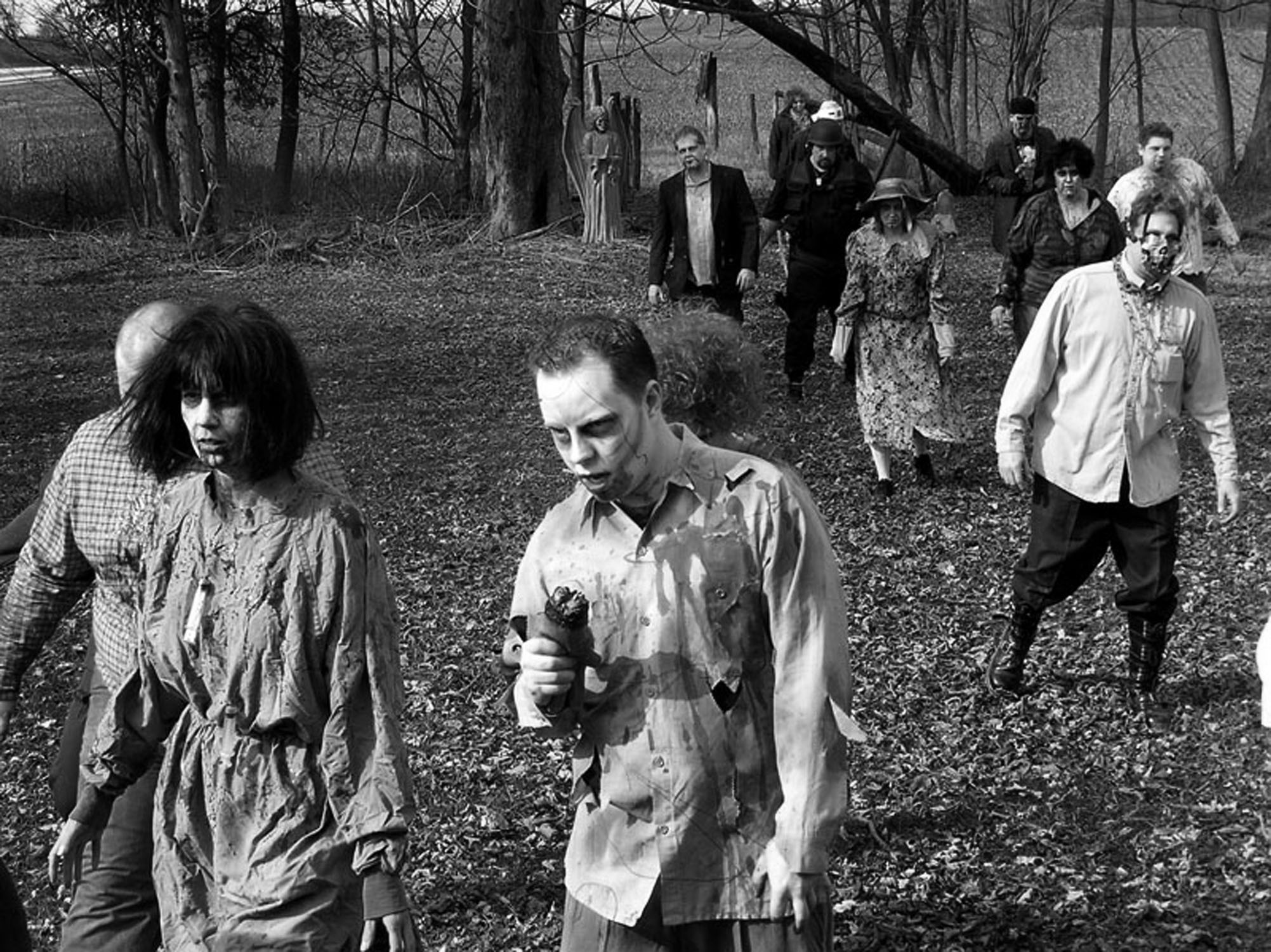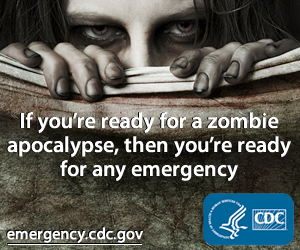What’s Worse? Hurricane Irene or a Zombie Apocalypse?

It’s been a strange, strange summer in Massachusetts this year. In June, a tornado hit Springfield, leaving behind severe damage and 4 dead. Last week, we felt shocks of the earthquake centered in Virginia. AND NOW, we are about to be hit by Hurricane Irene in what local weather-casters are calling the first hurricane to hit the area since Hurricane Bob in 1991. So what’s next? A Biblical plague like locusts? Or maybe…
ZOMBIES!?
We first ran this article in May, but it’s advice on how to be ready for natural disasters is suddenly pertinent again.
——————————————————————————————————————————————-
Who says the government doesn’t have a sense of humor? When it came time to come up with an idea for their annual campaign to raise awareness about the upcoming hurricane season, Centers for Disease Control and Prevention (CDC) associate director of communications Dave Daigle and his team got an idea from a tweet the CDC had recently received. It asked about zombies during the Japan nuclear crisis- and it seemed to generate a lot of buzz! Thus the idea of Preparedness 101: Zombie Apocalypse was born. After all, as the slogan for their campaign says:

The post by Ali S. Khan, which was on the CDC Public Health Matters Blog on May 16th, certainly seems to be getting a lot of attention. Normally, the CDC might get around 3,000 page views a week, but after word got out about the blog entry, the CDC Emergency’s Twitter feed went from 12,000 to 1.2 million followers. The volume to their blog site crashed several times because of the increase in traffic.
So what does the government suggest you need to do should the threat of zombies…or hurricanes or pandemics, actually happen?
First- have an emergency kit in your house and/or car. This includes things like water, food, and other supplies to get you through the first couple of days before you can locate a zombie-free refugee camp (or in the event of a natural disaster, it will buy you some time until you are able to make your way to an evacuation shelter or utility lines are restored). Below are a few items you should include in your kit, for a full list visit the CDC Emergency page:
- Water (1 gallon per person per day)
- Food (stock up on non-perishable items that you eat regularly) Remember to have a manual can-opener to get into cans if the electricity is out.
- Medications (this includes prescription and non-prescription meds)
- Tools and Supplies (utility knife, duct tape, battery powered radio, etc.)
- Sanitation and Hygiene (household bleach, soap, towels, etc.)
- Clothing and Bedding (a change of clothes for each family member and blankets)
- Important documents (copies of your driver’s license, passport, and birth certificate to name a few)
- First Aid supplies (although you’re a goner if a zombie bites you, you can use these supplies to treat basic cuts and lacerations that you might get during a tornado or hurricane)
Once you’ve made your emergency kit, sit down with your family and come up with an emergency plan. This includes where you would go and who you would call if zombies started appearing outside your door step. You can also implement this plan if there is a flood, earthquake, or other emergency.
- Pick two meeting places, one close to your home (such as your mailbox, or a neighbors front yard) and one farther away.
- Identify possible types of emergencies in your area. Besides a zombie apocalypse, this may include floods, tornadoes, hurricanes or earthquakes. If you are unsure contact your local Red Cross chapter for more information.
- Pick a meeting place for your family to regroup in case zombies invade your home… or your town evacuates because of a hurricane. Pick one place right outside your home for sudden emergencies and one place outside of your neighborhood in case you are unable to return home right away.
- Identify your emergency contacts. Make a list of local contacts like the police, fire department, and your local zombie response team. Also identify an out-of-state contact that you can call during an emergency to let the rest of your family know you are OK.
- Plan your evacuation route. When zombies are hungry they won’t stop until they get food (i.e., brains), which means you need to get out of town fast! Plan where you would go and multiple routes you would take ahead of time so that the flesh eaters don’t have a chance! This is also helpful when natural disasters strike and you have to take shelter fast.
——————————————————————————————————————————————-
Although we’re not in a flood plane, our house is surrounded by very tall, older trees. I’m glad we had them pruned and some cut down earlier in the summer, so it’s less likely that one will fall on our house. I’ve gotten together the bottled water, flashlights and batteries and got a fresh tank of propane for the gas grill (so we could still boil water and cook food if we are without electricity). I’ll make sure all of our electrical devices (like cell phones, laptop computers, etc) are fully charged and we have full tanks of gas in our cars. Then we’ll just sit and wait, ready for hurricanes, zombies or anything else that comes our way. If we get locusts, we can always just eat them like Angelina Jolie and her kids.
It might be a good time to read the Max Brooks’ book, World War Z, which is being made into a movie starring Brad Pitt and Breaking Bad’s Bryan Cranston.



























0 comments